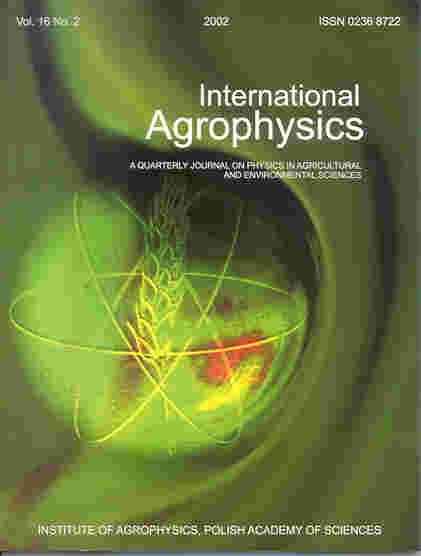|
|
|

|
|
| International Agrophysics |
| publisher: | Institute of Agrophysics
Polish Academy of Sciences
Lublin, Poland |
| ISSN: |
0236-8722 |
vol. 9, nr. 1 (1995)
|
|
|
previous paper back to paper's list next paper
|
|
|
Iodometric method of the determination of the exposed damage surface of cereal grain
|
|
| (get PDF ) )
|
|
|
A. Miś 1, S. Grundas1, Y. Takeda2, S. Hizukuri2
|
|
|
1 Institute of Agrophysics, Polish Academy of Sciences, Doświadczalna 4,20-236 Lublin, Poland |
|
|
2 Department of Biochemical Science and Technology, Faculty of Agriculture, Kagoshima University 21-24 Korimoto-1, Kagoshima 890, Japan |
|
|
vol. 9 (1995), nr. 1,
pp. 75-82
|
|
|
abstract
In this paper, a method for determining the area of the exposed damage surface of grain endosperm by means of the amperometric measurement of iodine adsorption has been presented.
According to the amperometric method, iodine is liberated by titrating standard potassium iodate into an acid solution containing potassium iodide and starch. In the place of starch specimen, the grain sample of a small amount was used. The elaborated method is based on a strict separation of a total adsorption of iodine by grain sample on its following parts: the grain coat adsorption and the exposed damage surface adsorption considering the coefficient of iodine adsorption by unit surface of damage endosperm. The separation of the total adsorption was possible owing the use of a test damage surface with measured area and a different soaking time of grain sample.
Basing on this method three kinds of barley grain originating from various growth regions were evaluated. It was found that the total adsorption of iodine by tested grain is determined in a different degree by both features of coat and endosperm in relation to the origin of the grain. This fact indicates that only the surface area of the exposed damage can constitute an objective and accurate measure for this kind of mechanical damage of cereal grain.
|
|
keywords
cereal grain, mechanical damage, io-dometry, area of exposed grain endosperm surface
|
|
|
|
|
|
|